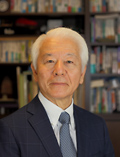

Itaru Yasui, PhD
Former Vice-Rector of United Nations University and Professor Emeritus of the University of Tokyo. He was working for the independent-institution National Institute of Technology and Evaluation (NITE) until March, 2015. He is currently Chairman of the Institute for Promoting Sustainable Societies, a general foundation. He is a member of the Advisory Committee for Natural Resources and Energy, Ministry of Economy, Trade and Industry and the Central Environment Council, the Ministry of the Environment. His specialties primarily include material science and the global environment.
The main topics of this year's CSR report is safety and accident prevention. Though there have been no changes to the basic philosophies of integrating management and CSR together as well as active and passive CSR, the unfortunate accident should be regarded as an opportunity to improve safety and accident prevention. Investing in facilities improvement also aligned, I believe, with the desired course of action of shareholders and institutional investors seeking long-term and stable profits.
In general, the ultimate goals of safety and accident prevention are reestablishing a safety culture, zero accident at facilities and so forth. When taking into consideration the current situation in Japan, however, the effects of the Great East Japan Earthquake on the Japanese mentality was quite significant. As Japanese are weak in dealing with risks and the event have only reaffirmed our desire to eliminate risk completely and simply give up if something does occur. However, a culture of safety does not mean setting zero risk as a goal. Though it goes without explicitly stating, a culture of safety represents the acceptance the existence of risks, the scientific and quantitative evaluation of risk, and the development of proper responses. In this sense, JSR is on the right path toward achieving this culture of safety. I hope that this approach to developing safety culture spreads throughout Japan in the general public and media.
The first step toward this goal was an establishment of a safety department as an independent entity. Final evaluations is yet to come. I feel that this is the right direction to take, however. Issues likely to remain after the end of the year include a withdrawal from a desire of simply returning to doing things as they always have been done or as written in procedural documentation. In the past, experts working in manufacturing plants would have detected subtle changes in the health of equipment and processes with their superior skill and experience. With all of the advancement in automation that has occurred, however, it is now difficult to develop such skills in workers. Despite this reality, we must resolve to train and develop such skilled workers now and in the future.
In June of this year, the government declared greenhouse gas reduction targets of 26% by the year 2030 in response to the climate change summit. As part of the active CSR strategy employed by the JSR Group, businesses have been established by E2 InitiativeTM to support energy and resource conservation and climate changes. Yet, the key to achieving this national target will be the drive toward innovation throughout all of Japan. Given the difficult path ahead toward the year 2030, I hope all major companies in all fields begin to analyze and consider how to reach the quantitative goal of reducing their entire supply chains by 30%.
As with every year, I enjoy reading dialogues. My impression of this year's article is that workplace communication and awareness are excellent. This is very important. I was also impressed by the statement "employees feel a sense of security as undocumented or unclarified morals are given importance." I was delighted to feel that the organization was like a healthy living being.
In conclusion, I believe that corporate governance codes were implemented this year, and that ESG investment is beginning to gain traction. This results in a strong likelihood for significant change in corporate activities at the JSR Group. I really hope the JSR Group remains a leading CSR-focused company.